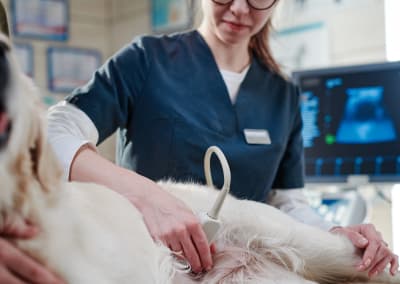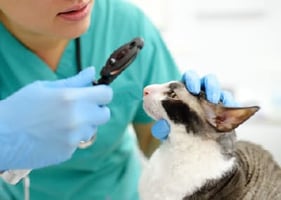Every vet has had a situation where they don’t know what’s wrong – and that’s ok. People often say that veterinary medicine is an art, not a science – in our experience, that’s exactly right. But if you find yourself struggling with ultrasounds, and guessing more than you should, it’s worth considering veterinary ultrasound training courses.
Ultrasound is a skill that can make diagnoses easier, faster, and cheaper for your clients – which is great for your business' bottom line. But how can you tell if your skills are getting a bit rusty? Here are some signs your ultrasound skills need a top-up and should be a priority in your CPD plan.
Signs you need veterinary ultrasound training
1. You’re struggling to remember the difference between the liver and the spleen
No judgement – it's tricky. What you learn at vet school – with those perfect patients and good quality machines – suddenly falls out of your head when you’ve got a diagnosis resting on your skills. If you find yourself struggling to recognise anatomical structures, it’s time for some ultrasound CPD.
2. You don’t have a structured approach to a scan
Ultrasound scanning shouldn’t be a ‘put on the probe and hope’ situation. You should have a structured approach that means you scan everything you need to, in the same order, every time. While consensus statements like this one exist to guide clinicians, they don’t suit everyone and every situation – a good ultrasound CPD course will help you find your own rhythm.
3. You reach for every other diagnostic tool before ultrasound
If your respiratory distress cat gets an x-ray first, or you send bloods to the external lab for all sorts of liver tests rather than picking up a probe, you’re probably in need of some veterinary ultrasound CPD. While there’s nothing wrong with using other diagnostic tools, ultrasound gives usually fast, real-time, valuable results. Don’t pass it over in favour of other tools just because you’re feeling unconfident!
4. You find yourself referring for ultrasound scans
If something comes in needing a scan, do you try to book it for a day you aren’t there? Or make sure it’s on someone else’s list? Or do you make a start, then grab an experienced colleague for help? Do you refer to a local centre for echocardiography? If you’re regularly trying to avoid doing scans on your own, a confidence-boosting ultrasound course is what you need.
5. Your cases are frequently difficult to diagnose
It’s normal for some cases to defy diagnosis or have confusing test results. But if this is happening regularly, particularly if it’s because you’ve been avoiding booking the pet for a scan, it’s probably worth taking some veterinary ultrasound training so you can add this diagnostic string to your bow. You’ll find cases fall into place easier when you have all tools at your disposal!
6. You struggle to write a report
An essential part of a small animal ultrasound is the written report, enabling other vets to see what you’ve seen. Even when you’re a whizz with the problem, getting it all down in a format someone else can understand can be tricky.
7. You want to add a new service to your practice
Of course, there are some other reasons you might want to improve your ultrasound skills that aren’t related to things going wrong – and the chief among these is that you’ve identified an opportunity to help your veterinary practice grow their services. Whether you’d like to offer faster, more convenient pregnancy diagnoses, POCUS triage, advanced echocardiography, or something else entirely, improving your veterinary ultrasound skills can help you find your place in your team – and help pets in the process.
The importance of a good ultrasound machine
There are veterinary practices out there with ancient machines that struggle to even identify a bladder. If your machine isn’t up to scratch, it can affect what you can see and diagnose. Try changing your ultrasound machine settings – if that isn’t helping clear up an image, but you can see everything clearly on your veterinary ultrasound CPD courses, consider talking to your boss about getting a new machine. Take note though - they’ll be much more likely to do this if you’ve been on a CPD course and can prove it’s the machine, not your skills, at fault. Lack of skills is a significant reason why vet practices don’t invest in ultrasound machines (DeFrancesco 2018) – so increasing your skills is the first step.
Conclusion
If you feel yourself struggling with ultrasound, hating report writing, or taking a long time to find nothing much at all, it’s worth considering investing in veterinary ultrasound training. Find out all about our Ultrasound CPD Courses for 2026, or consider the Diagnostic Imaging Certificate programme.
_BL_CourseThumb.jpg?width=500&height=300&name=IVE_GPCert(DI)_BL_CourseThumb.jpg)
Diagnostic Imaging
ISVPS General Practitioner Certificate (GPCert)
HAU Postgraduate Certificate (PgC)







